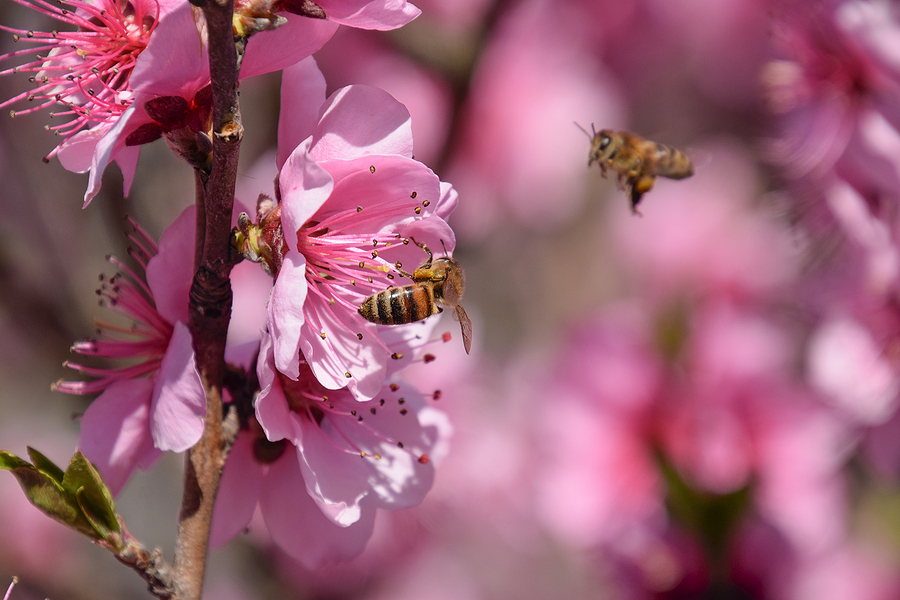Top Pollinators and Their Benefits
- Details

Pollinators are defined as any kind of animal or insect that assists in the process of transferring pollen from the male part (antler) of a flower to the female part (stigma) of the flower. The movement of pollen is essential so that the fertilized plant can produce fruits and seeds.
The majority of the world’s flowering plants require a pollinator to reproduce; and humans need pollinators too, since most of our food comes from flowering plants. Bees, wasps, butterflies, hummingbirds, and even some species of beetles are essential pollinators that are drawn to the nectar in flowers.
Bees and wasps
Bees play a crucial role as pollinators in ecosystems worldwide. Their intricate buzzing between flowers and hives facilitates the transfer of pollen, enabling the fertilization of plants and the production of fruits and seeds. This symbiotic relationship is vital for biodiversity and agricultural productivity. Various bee species exhibit specialized behaviors and preferences, contributing to the diversity of pollination strategies. As highly efficient pollinators, bees enhance the reproduction of countless plant species, making them integral to the sustenance of global food sources.
Wasps and their relationship to pollen and pollination is a bit different than bees as wasps don't feed their young pollen. Instead, they feed mostly on other insects. Although they don't collect pollen, they do frequent flowers and transfer pollen from other plants. Making them a beneficial pollinator, and an effective, natural predator of some destructive bugs.
Butterflies
Butterflies aren't one of the most abundant pollinators as their bodies aren't easily coated in the yellow dust of pollen like bees’ fuzzy bodies. They also tend to sit at the side of flowers rather than in flowers, like bees. But they are essential pollinators and are especially vital to cotton flowers which are typically not a big attractant to other pollinators. This relationship helps add millions of dollars to the cotton harvest.
Hummingbirds
Hummingbirds are remarkable pollinators known for their grace and unique characteristics. With their beautiful plumage and incredible hovering flight patterns, they navigate through a variety of flowers, sipping nectar with their specialized, elongated bills. As they feed, their heads come into contact with the reproductive parts of flowers, facilitating cross-pollination. Hummingbirds have an exceptional memory, frequently returning to the same plants, contributing to the efficiency of pollination. Their rapid wing beats and body shape make them essential in pollinating certain flowers with tubular shapes, as other pollinators might struggle to access these blossoms.
The dependence of specific plant species on hummingbirds for reproduction highlights their vital role in maintaining diverse ecosystems. This unique pollinator is not only a joy to watch but also one of the few avian pollinators.
Beetles
Beetles aren't typically the first species to pop into mind when thinking about pollinators, but flower-visiting species like soldier beetles, scarabs, long-horned beetles, sap beetles, and checkered beetles all provide important pollination. Although they may be lesser-known pollinators, beetles were among the first insects to visit flowers and they remain essential pollinators today. Several characteristics are common among beetle-pollinated plants. These include large cup-like flowers that are typically open during the day, heavily scented blossoms, and leathery or tough petals and leaves. They are especially important pollinators for species such as magnolias.
Responsible and trusted pest control services
Some pollinators, such as certain species of stinging insects, can also become a nuisance, especially for those with sensitivities to their sting. If you need help with a wasp or bee concern or any other pests contact your local, trusted experts at Eagle Pest Services. We know that responsible management of pests is of the utmost importance. Call our experts today at 1-(866) 281-1822 for a free inspection to address all of your pest control needs.





